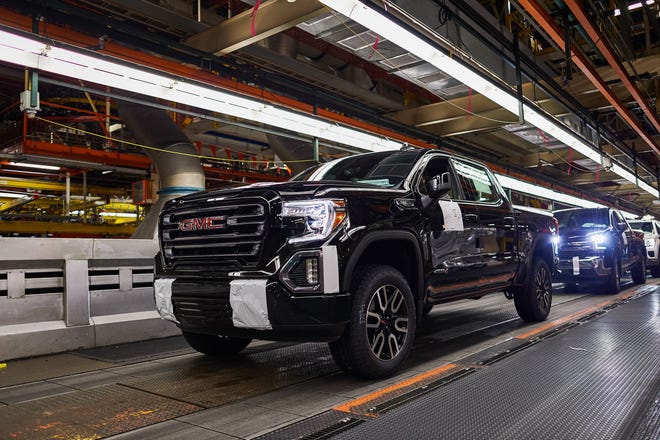General Motors will start building some of its most profitable and in-demand 2021 full-size, light-duty pickups and SUVs without the Automatic Stop/Start feature because of a global shortage in semiconductor chips.
The automaker is also making upgrades to its full-size pickup plant near Fort Wayne, Indiana. to speed up final assembly of tens of thousands of incomplete pickups parked and awaiting chip parts.
GM is also looking to hire hundreds of temporary workers at Fort Wayne Assembly and Flint Assembly plants to help push out pickups.

Since early this year the auto industry has had to either idle assembly plants or build vehicles shy of all the parts and then park them to await the arrival of chips. The result is comparatively empty dealer lots and a scramble to get as many vehicles built and shipped as possible when parts do arrive.
More:GM build-shy strategy has tens of thousands of vehicles parked awaiting chip parts
The chips, made mostly in Taiwan, are used in a variety of electronics. They are in tight supply after demand for them rose during the COVID-19 pandemic as people bought laptops and other personal electronics that also use them. The chips go into a variety of car parts.
Affected vehicles
Starting Monday certain full-size SUVs and pickups will not contain Automatic Stop/Start, the feature that turns off the engine when a driver stops at an intersection and then automatically restarts it when the driver steps on the throttle.
“By taking this measure, it will enable us to continue production of our high-demand full-size SUV and pickups as the industry continues to rebound and strengthen,” said GM spokesman Kevin Kelly. “Most of the affected vehicles will experience a minor reduction in fuel economy and customers will receive a $50 credit on the MSRP for affected vehicles.”
The fuel economy adjustment will vary by vehicle, Kelly said, but generally it is around 1 or 2 miles per gallon on the combined Environmental Protection Agency rating.
The Automatic Stop/Start feature will no longer be available on 2021 model year for the following vehicles equipped with 5.3-liter and 6.2-liter V8 engines mated to 10-speed transmissions:
- Chevrolet Tahoe and Suburban full-size SUVs
- GMC Yukon and Yukon XL full-size SUVs
- Cadillac Escalade and Escalade ESV full-size SUVs
- Chevrolet Silverado 1500 full-size light-duty pickup
- GMC Sierra 1500 full-size light-duty pickup
The trim levels without Automatic Stop/Start include base models, High Country, Denali, AT4, sport and certain trail editions, Kelly said.
A fluid situation
GM builds its full-size SUVs at Arlington Assembly in Arlington, Texas. Like many of GM’s plants, it has had to build-shy hundreds of vehicles to await parts.
“Our supply chain organization continues to make strides working with our supply base to mitigate the near-term impacts of the semiconductor situation,” Kelly said in an email.
This isn’t the first time GM has decided to build vehicles without a certain part due to the chip shortage. In March, GM said it will build certain 2021 light-duty full-size pickups without a fuel management module until the end of the model year in late summer.
More:GM to increase vehicle deliveries to dealers: ‘Help is on the way’
‘Too much overload’
This week GM started construction on four new vehicle stalls in the body shop area of Fort Wayne Assembly, which had been empty for years, said Rich LeTourneau, UAW Local 2209 shop chairman, the local that represents some 4,000 hourly workers at the plant where GM assembles its light-duty pickups.
The extra stalls will allow GM to finish production on pickups awaiting chip parts when the parts arrive, LeTourneau said. GM needed the extra space because the finish area, where that work is typically done, is “jammed up.”
“It’s too much of an overload for the department that normally does it,” LeTourneau said. “We’ve never had a spillover like this. We’re utilizing our whole body shop to get these trucks to customers.”
GM’s Kelly confirmed the automaker has added “quality verification” booths at the Fort Wayne plant to get more finished vehicles to dealers.

Fort Wayne Assembly has increased its shifts and mandatory overtime to meet customer demand, LeTourneau said. The plant is trying to hire 275 temporary workers to help with production, he said, but struggling to get applicants.
At Flint Assembly, where production is increasing, GM is looking to hire 450 temporary workers, a spokesman said.
Meanwhile, LeTourneau said that some dealers have told him they are discontinuing offering GM’s friends and family discount because “they have no inventory.”
Kelly would not confirm or deny that, but said, “It has always been the dealer’s discretion as to whether they want to participate in the program.”
More:MSU gets a cash windfall from GM as the automaker parks unfinished cars
More:This UAW shop chairman is a GM truck dealer’s best friend
Contact Jamie L. LaReau at 313-222-2149 or jlareau@freepress.com. Follow her on Twitter @jlareauan. Read more on General Motors and sign up for our autos newsletter. Become a subscriber.